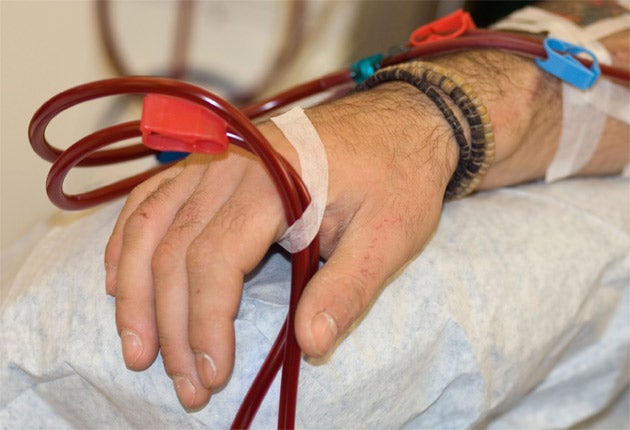Hospital staff 'fail patients in dying days'
Report highlights lack of communication between doctors and families

Your support helps us to tell the story
From reproductive rights to climate change to Big Tech, The Independent is on the ground when the story is developing. Whether it's investigating the financials of Elon Musk's pro-Trump PAC or producing our latest documentary, 'The A Word', which shines a light on the American women fighting for reproductive rights, we know how important it is to parse out the facts from the messaging.
At such a critical moment in US history, we need reporters on the ground. Your donation allows us to keep sending journalists to speak to both sides of the story.
The Independent is trusted by Americans across the entire political spectrum. And unlike many other quality news outlets, we choose not to lock Americans out of our reporting and analysis with paywalls. We believe quality journalism should be available to everyone, paid for by those who can afford it.
Your support makes all the difference.Four out of 10 patients admitted to hospital close to the end of their lives received poor care from the NHS, a report says today.
About 300,000 people a year die in hospital but poor communication with patients and their relatives and between doctors is blighting their final days, according to the National Confidential Enquiry into Patient Outcome and Death (NCEPOD).
Although half the patients were not expected to survive when they were admitted, doctors failed to make the judgement that they were approaching the end of their life which would have enabled medical staff to provide appropriate care.
Marisa Mason, chief executive of NCEPOD, said: "There were problems in all areas of care but end of life care stood out as a case where things went wrong. There was poor communication with the patients, with the relatives and between the doctors.
"Correctly identifying someone as near the end of life might mean that they were allowed to leave hospital and go home, or that they were given appropriate pain relief or conversely that something could be done to treat them rather than let them die."
The report is based on a review of 3,000 patients of all ages who died within four days of admission. Although they were very sick, 39 per cent did not get the high standard of care they should have done. In 53 per cent of cases consultants did not get involved early enough, "leading to delays in giving patients timely and appropriate care".
The report says: "Change in the hospital team structure over recent years has seen individual clinicians become transient acquaintances during a patient's illness rather than having responsibility for continuity of care. Staffing arrangements and shift working have also been shown to be disruptive and with the implementation of the European Working Time Directive, this disruption is likely to continue and to impact on the training of tomorrow's doctors."
In one in four cases there was a "clinically important delay" before the patient was seen by a consultant, access to CT and MRI scanning is a "substantial problem" at many hospitals and in one in five hospitals "do not attempt resuscitation" orders were signed by "very junior trainee doctors". The report says district hospitals "may have particular problems delivering a high standard of care when dealing with very sick children", because of the need for a well co-ordinated team.
Professor Tom Treasure, chairman of NCEPOD, which collects anonymised details of deaths in hospital to analyse trends and make recommendations for safer care, said: "It should be ensured that patients achieve the best quality of life until they die. Effective team working and communication with patients, relatives and carers are fundamental to getting this right."
Join our commenting forum
Join thought-provoking conversations, follow other Independent readers and see their replies
Comments